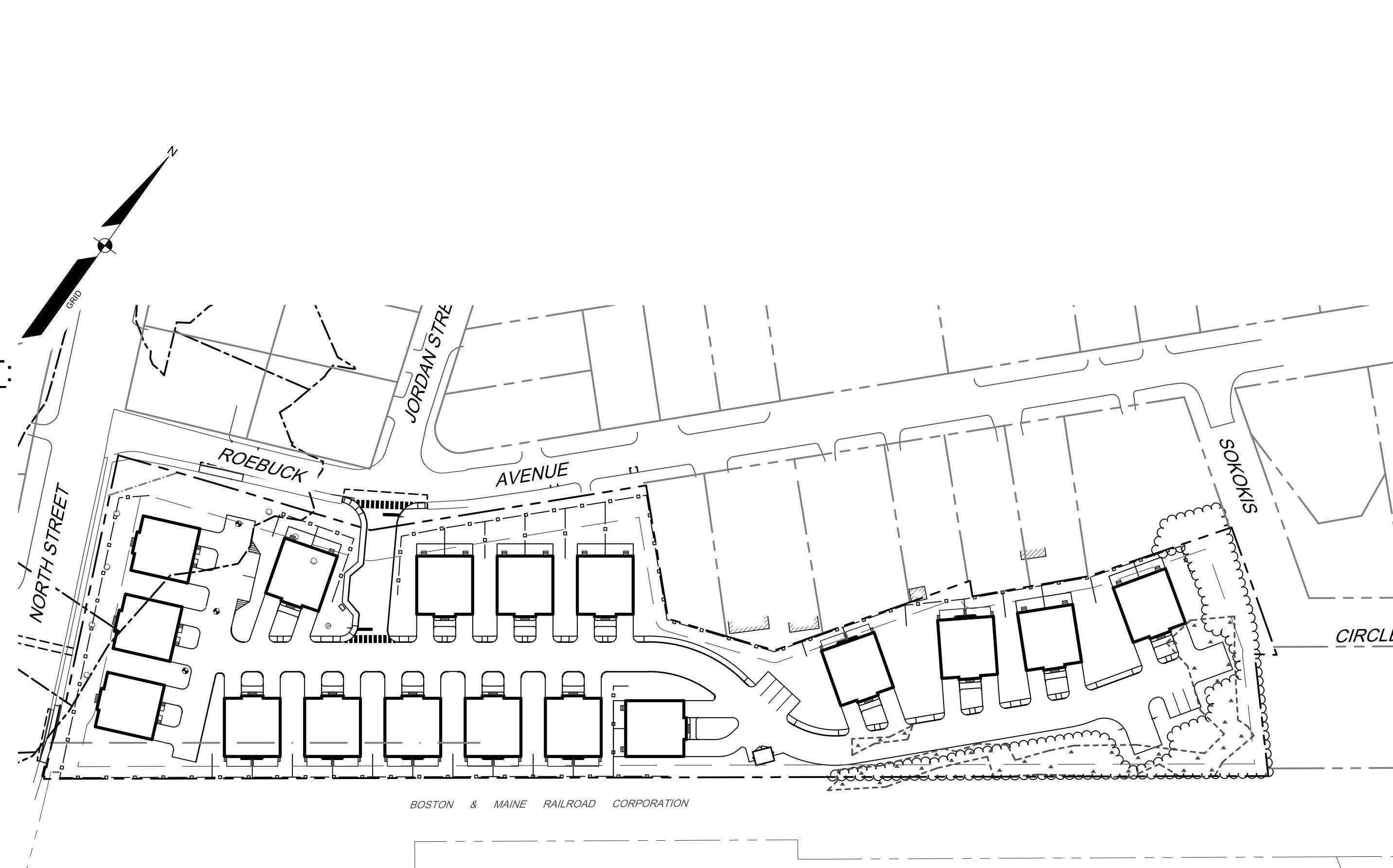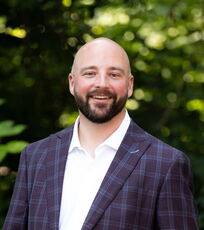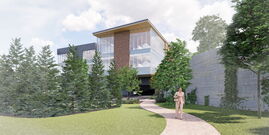
A dentist-turned-developer has 34-unit development underway in Saco
 Photo / Courtesy Beylin Development
Beylin Development’s first project in Maine, a recently completed an apartment complex in Windham, has features similar to those planned for Saco, including the kitchens’ granite countertops and energy-efficient stainless steel appliances.
Photo / Courtesy Beylin Development
Beylin Development’s first project in Maine, a recently completed an apartment complex in Windham, has features similar to those planned for Saco, including the kitchens’ granite countertops and energy-efficient stainless steel appliances.
A New Hampshire-based developer that has over half of its projects in Maine acquired 4.2 acres in a Saco opportunity zone and has site work underway for the construction of 34 rental units.
Authentic Foundations 300 North LLC bought 201 North St. and 15 Roebuck Ave. from North Street Partners LLC and German Auto Services for $1 million.
Matthew Pouliot of Pouliot Real Estate and Leo Bourgeault and Steven Liautaud of Coldwell Banker Realty brokered the deal.
The two addresses are two sides of the parcel. An automotive shop was at 201 North St.; those buildings were taken down as part of the development.
17 duplexes
Authentic Foundations 300 North LLC is owned by Beylin Development in Windham, N.H. The development will consist of 17 three-bedroom duplexes making up 34 three-bedroom units.
It’s expected the project will be completed in two phases over 18 months. Beylin Development will oversee the process from planning through execution.

Initial site work includes installing water and sewer infrastructure. The plan is to install roadways in the spring. After that, it could take about 12 months to construct the units, said Simon Beylin, the company’s president.
Features include high-end finishes and energy efficient systems, said Beylin.
The development has a total cost of $14 million. The Bank of New Hampshire provided 75% of the financing. Four investors are providing the rest.
The architect is Rob Hannon of RWH Architecture in Salem, N.H. Site work planning was provided by Sebago Technics in South Portland.
The vertically integrated development firm provides in-house construction through its company Beylin Builders.
Rents are still to be determined.
“Our goal is to offer rents that are competitive with local comparable units,” said Beylin.

Partners in the project include Beylin, Peter Anania, Anthony Prezioso and Vikas Patel.
Anania is a partner in Beylin Development, handling development and property management, identifying projects and collaborating on underwriting and guiding projects through the predevelopment process.
From dentistry to real estate
As a young man, Beylin worked with his father in California building large multifamily projects. He then went to dental school and became an endodontist. Building on both interests, he founded a commercial construction company tailored to the needs of dental and medical practices.
In 2015, he founded Beylin Development to be a vertically integrated developer and commercial contractor in multifamily, mixed-use, medical and commercial real estate across New England. Development, construction and property management are managed in-house.
The first project in Maine was at 4 Stockyard Drive in Windham, where the company recently completed a 33-unit apartment complex that received over 100 inquiries in two weeks, he said. Two-bedroom units start at $2,245, intentionally lower than comparable apartments in nearby towns leasing for $2,495 to $2,915, Beylin said.
Larger developments are in the planning stages in southern Maine, New Hampshire and Texas. Almost all are geared toward workforce housing, said Beylin.
The development focus is on long-term holds in high-growth, low-vacancy areas where housing units are consistently in demand.
“Emphasizing long-term holding not only ensures the stability of our investments but also leverages significant tax benefits that come with holding properties over extended periods,” according to the company.
Long-term holds
Beylin remains connected to the dental community, offering education and guidance on real estate investment through events, speaking engagements and investment opportunities.
Investors and partners in the development projects mainly come from the dental and medical communities. At the Saco project, they include Prezioso and Patel.
A practicing dentist, practice owner and investor with a background in finance and real estate, Prezioso facilitated the acquisition of the Saco acreage after implementing what he learned while attending a Beylin Development “Mastermind” session.
Patel grew up in India, where his father was a real estate developer. After immigrating to the U.S. and earning his dental degree, he is now pursuing real estate development.
The dental connection is no accident. From the investment standpoint, said Beylin, the long-term hold model works well for medical and dental professionals looking for ways to have passive income but in ways they can feel good about their investment.
In September, Beylin was a presenter at the Real Estate Investment Summit for Dentists in Texas. The summit was offered by Real Estate Investment for Dentists, a platform for dentists who want to share or learn about real estate investment for passive income, according to its Facebook page.
Beylin’s presentation, “From Dirt to Dollars: Investing in Ground-Up Real Estate Development,” discussed ground-up real estate development as “a compelling option for investors who are ready to dive deep into the world of property development,” according to his abstract.
He offers “mastermind” events specifically tailored for dentists and doctors, introducing them to ground-up real estate development.
A mastermind is a curated event or community that brings together a group of individuals who share a common goal or purpose, often in personal or professional development, acceding to REI/kit.
Beylin’s sessions provide information such as how to invest passively in vetted projects with steady returns and tax advantages, with a focus on addressing critical housing shortages while delivering stable returns while they also continue to pursue their primary careers.
“Simon educates other professionals about what they can do in real estate, pulling in people who might have otherwise put their money into a 401(k) or not invest at all,” said Pouliot.
Opportunity zone
After attending one of Beylin’s mastermind sessions, Prezioso identified Saco’s opportunity zone as a draw for housing development.
Opportunity zones are an economic development program established under the federal Tax Cuts and Jobs Act of 2017. The economic development tool incentivizes people to invest in distressed areas through tax benefits provided when they roll capital gains into qualified projects.
Opportunity zones essentially encourage the long-term hold model in that it provides tax deferments and reductions based on certain time frames.
Federal law allowed governors from each state to nominate 25% of a state's eligible low-income census tracts to be designated as opportunity zones. In 2018, 32 zones were designated in Maine.
Saco has the only opportunity zone in York County.
“It’s safe to say this project wouldn’t be moving forward if it weren’t in an opportunity zone,” said Pouliot.

The plan for the Saco development is to build the duplexes as rentals but with a long-term hold.
“When individuals invest in projects like this, it’s set up to be a buy-and-hold situation,” Pouliot added.
He continued, “The gist is to incentivize long-term investment in communities. It’s not the type of thing where people get in and get out quickly. Beylin Development is not looking for quick investments. They’ll be here for the long term.”













0 Comments